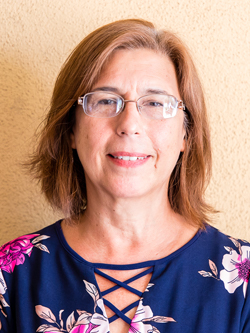Spotlight Series: Rhonda O'Cana
July 9, 2020

Over the past several years, Palo Alto College has dedicated renewed energy toward making sure students’ basic needs are met. Ensuring that students are safe and secure – and that their physiological needs are met – can, in turn, improve the trajectory of students’ educational careers.
Before the coronavirus outbreak, national data reflected high levels of anxiety among America’s college students. With the added complexities brought on by the pandemic and social unrest, mental health awareness and support is a critical aspect of helping students be successful in their academic journey.
"Mental health affects every aspect of your life," said personal counselor Rhonda O'Cana. "If students are experiencing anxiety, depression, or other mental health conditions, it can get in the way of their ability to function and be present. It's just so important for students to be able to be in a good frame of mind."
Since the move to remote operations as a result of the COVID-19 pandemic, Counseling Services has continued to offer services remotely through video conferencing, email, and phone.
O'Cana and her team conducted a survey of Palo Alto students during the spring 2020 semester after about a month into remote learning.
With 256 respondents, the survey found that compared to before Spring Break:
- 68 percent of students are experiencing increased anxiety
- 42 percent of students are experiencing increased isolation
- 65 percent of students are experiencing increased sleep problems
"Not only are we worrying more, but we're isolated. When you're going through a crisis, we as humans are drawn to each other," said O'Cana. "We need to help each other."
Counseling Services has been reaching out to students by taking part in the College's Social Circles sessions hosted virtually every Wednesday. Counselors provide students with advice on topics like nurturing positive relationships, managing emotions, and nutrition for mental health.
During this time in which people are unable to gather together physically, O'Cana said it is important to find safe ways to connect and to find activities that bring joy.
- Connect with friends and family. Stay grounded and continue to cultivate positive relationships. If you can't see them in person, use technology. Host a Zoom meeting, or contact them via Skype or FaceTime.
- Do what you love. Identify the things you enjoy doing and that you're good at. It might be a hobby like gardening, sewing, or painting. This might be a good time to expand on your skills.
- Be a part of something bigger than yourself. Some find connection in nature, while others may find meaning in service. Get out into nature, experience the grandeur of the outdoors, the sky, and fresh air. Join a nonprofit or do nice things for other people like sending someone a message saying how much you appreciate them.
- Take care of your physical health. Make sure you're eating whole foods and nutritious meals. You can also take supplements; vitamin B complex is especially useful for stressful situations and can help stave off the adverse effects of stress. Make sure you are getting enough sleep and exercise. Even a 10-minute brisk walk outside can work wonders.
- Work towards your goals. Goals can help bring focus. Actively working towards them can bring a sense of achievement and contribute to your overall well-being.
O’Cana said while it can be a challenge to raise mental health awareness among college students, simply talking about it can help students and destigmatize the very human need for support.
"Practice self-care, and make sure you are paying attention to your feelings and reach out if you're feeling lonely. Reach out because most likely someone else is too," said O'Cana. "Even if you're not someone who's an extrovert, people need each other on a basic human level to be there for support."
Counseling Services provides mental health services, including short-term and crisis counseling, at no cost to currently enrolled Palo Alto College students. Students are encouraged to speak with a counselor to develop strategies that will promote academic and personal success. The team can be reached by phone at 210-486-3750, students are encouraged to leave a message, and counselors will return calls throughout the day. Students can also reach out via email at pac-counselor@alamo.edu.



